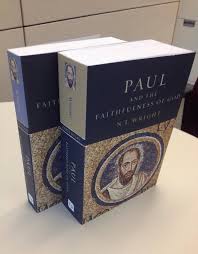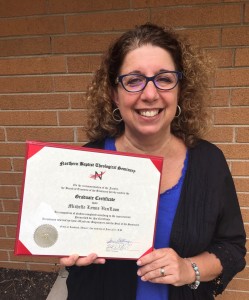Part of the delight of my seminary experience so far (I’ve completed two classes and am enrolled in a church history course this quarter) has been gaining new thinking partners. The promise that seminary would introduce me to new thinking partners was alluring bait for me when I first spoke with an admissions officer at the school last summer. So far, the classroom has indeed fulfilled that promise.
Some of those new thinking partners have been other students. It’s a rush to be in a room full of people just as eager to learn as I am. Their great questions of the teachers and their spirited times of class discussion were super-energizing for me. Some of those new thinking partners have been my instructors. It’s been a joy to listen to them as they share out of the deep wells of their acquired knowledge.
 And of course, there are the books. Last quarter, I took a class on Acts and the Pauline epistles with Dr. Scot McKnight. The primary text for the class was a book so long it needed to be published in two volumes – N.T. Wright’s 1700 page Paul and the Faithfulness of God. That is not a thinking partner. It’s an entire thinking team.
And of course, there are the books. Last quarter, I took a class on Acts and the Pauline epistles with Dr. Scot McKnight. The primary text for the class was a book so long it needed to be published in two volumes – N.T. Wright’s 1700 page Paul and the Faithfulness of God. That is not a thinking partner. It’s an entire thinking team.
It was some of the densest, most challenging reading I’ve ever done. Some of it flew right over my head like a flock of geese. Most of my classmates said they were having the same experience with this material. Thankfully, the class discussion and some of the other reading about Wright’s ideas I’ve done over the years sketched the main ideas from the portions of the text for me in a way that trying to soldier my way through the book alone wouldn’t have. (Scot McKnight has been blogging his way through this massive work at his blog.)
While I’m not even remotely prepared to debate Wright’s New Perspective (summarized concisely in the current issue of Christianity Today magazine as part of a profile of the theologian), I can say that I appreciated some aspects of Wright’s approach. I particularly valued his amazing scholarship that placed Paul in his first century context and challenged the Protestant Reformation-identity we often ascribe to him as the first preacher of the doctrine of Faith Vs. Works. Wright confirmed what I’ve often suspected – Paul would have been pretty darn surprised to find out the parts of his teaching we’ve over-emphasized, and what parts we’ve breezed past or diminished in order to make his teaching fit our endlessly-reforming theologies. It was remarkable to witness the way in which Wright referenced hundreds of original sources and connected historical and cultural dots. I appreciated his ability to build an elegant case and answer the objections of his opponents as he did. And there was a touch of the everyman in his scholarship. Even though he’s brilliant and knows so, there were flashes of approachable humor tucked into his words in unexpected places.
I am grateful for the exposure to his work, but left the class feeling that while the New Perspective offered a helpful corrective to the way in which we’ve talked about the context of Paul’s teaching for the last 500-ish years, I couldn’t shake the feeling that the way in which he applied his ideas to Paul’s teaching still netted supercessionism (albeit a gentler version than the standard Reformed version). I found this analysis of Wright’s ideas in Paul and the Faithfulness of God by Larry Hurtado to be helpful in articulating a few of my half-formed questions.
I am in seminary to learn how to ask better questions. My half-formed questions lead me to continue to wrestle with the fact that when it comes to the covenant, irrevocable promises of land, temple and king God made to ethnic Israel, of which I am a member, the church either over-spiritualizes or hijacks those promises in ways that have had devastating consequences for my people – and ultimately, for the grafted-in branches who are my treasured brothers and sisters in Jesus the Messiah as well. Some of Wright’s ideas are a helpful step in a new direction, but in the end, my questions don’t allow me to follow him in that new direction. Not while I have these questions continuing to simmer in my soul at the core level of my own identity as a Jewish believer.
The questions aren’t a bad place to be as a student, or as a follower of Christ. I think they are a sign that I am trying to better learn to love God with my mind in a seminary classroom.
So if you’ve read some (or all!) of this impressive work on Paul, did it leave you with more questions or better answers about Paul’s ministry?










